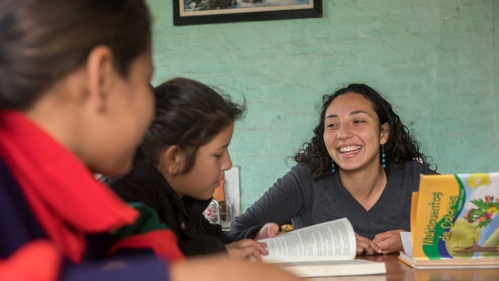
Short-Term Non-Degree Students
About
Rutgers has a number of short-term, non-degree programs—these can be exclusively for international students or they can be programs for both international and domestic students. These do not award a degree to the participant and are often focused on a specific skill or outcome that leads to the "attainment of a specific educational or professional objective.”
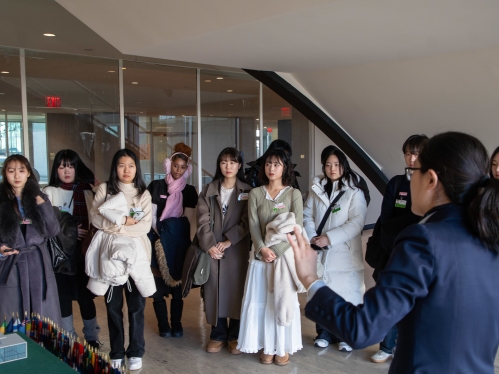
Study Abroad Exchange Programs
You can join Rutgers for a semester or academic year through our student exchange program. Undergraduate students may come to the United States on a Rutgers-sponsored J-1 exchange visa and pursue a full course of study in a credit-bearing program as part of a study abroad exchange agreement.
Graduate students may participate in a semester abroad by applying directly to the School of Graduate Studies–New Brunswick as a non-matriculating student.

Rutgers Student Interns
Rutgers units can offer to host current students, who are studying abroad, as student interns on a J-1 visa status. The J-1 Student Intern Category is not to be confused with J-1 Students who are enrolled in a degree program at Rutgers. The J-1 Student Intern refers only to a student currently in a degree program abroad who visits Rutgers to engage in a project/research-based internship that is integral to the curriculum of the home institution's degree program to which the intern will return.
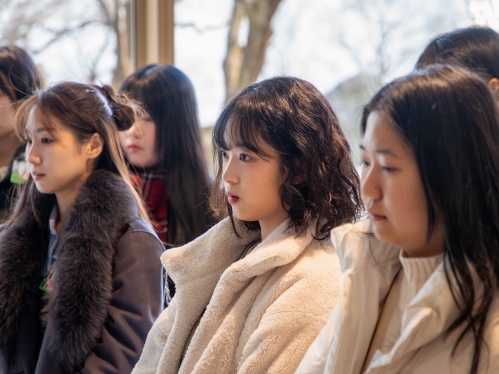
Accordion Content
-
-
Reach out to the Rutgers Unit in your chosen career field with your CV/Resume and explain your desire to pursue an internship opportunity.
-
Contact specific Rutgers Professors or Faculty with whom you may have common research interests with and would like to work with.
-
Attend conferences and other events where you may be able to meet and associate with Rutgers faculty.
-
Search out current Rutgers Global Partnerships to see which Rutgers School/Unit is currently hosting international students/scholars.
Please be sure the potential intern and the sponsor unit/department are able to meet the requirements below before requesting to sponsoring a J-1 student intern.
-
-
-
Must be a currently enrolled full-time student in the chosen career field at a degree or certificate-granting postsecondary academic institution outside the U.S.
-
Must have a sufficient grasp of the English language to function on a day-to-day basis.
-
Must return to your academic program abroad to fulfill and obtain the degree after completion of the internship program. This program is not available to students who have graduated, or will be graduating before their internship ends.
-
Must submit a letter from your home institution to confirm the internship will fulfill the educational objectives of your current degree program AND that you will complete your degree AFTER your internship period, upon returning to home institution. Also, your letter must approve you to accept any financial support from Rutgers, if applicable.
-
Must have sufficient funds to support your duration of stay support from home institution or personal/family funds. Submission of the Certificate of Funds with proof of liquid funds of at least $413/week for undergraduate and graduate student interns).
-
Must have a passport valid for six months beyond the end of the internship period.
-
Students must depart the U.S. within 30 days of the completion of the program.
-
Must have/will purchase health insurance that meets the requirements set by Rutgers University when before arriving in the US.
-
-
-
Time Frame: Must be full‐time, at least 32 hours per week, as little as three weeks and at most, up to 12 months for each foreign degree or major.
-
Conditions: Internships can be paid or unpaid, and this work-based learning position must not displace U.S. workers. Most Rutgers Student Internships are unpaid but provide an excellent opportunity to learn and gain useful skills. The Rutgers Sponsor Unit will create a structured work‐based program using a Trainee/Intern Placement Plan (DS-7002). No more than 40% of the work can be remote, so two out of the five days can be remote and the rest of the time must be in-person.
-
Training: May not include an unskilled or casual labor position, and any position that requires or involves child care/elder care, aviation, or clinical positions that involve patient care or contact (requiring medication, or other clinical or medical care). The position can require no more than 20% clerical work and SEE HERE for guidance on any program activities involving physical contact between exchange visitors and human participants and/or animal subjects. Rutgers Sponsoring Units must ensure the internship placement that is developed must these criteria.
-
Location: All work must take place on-site, on Rutgers University property. No work may be performed at a third-party location.
-
-
-
Passport: Prospective Student Interns must have a valid passport valid for at least six months beyond your period of stay in the United States (unless exempt by country-specific agreements)
-
Documents: Must have received the Certificate of Eligibility (DS-2019) and DS-7002 (Trainee/Intern Placement Plan) and a J-1 visa in passport (when applicable).
-
Communication: Keep in close contact with the Rutgers Unit to be sure they are aware of your anticipated arrival date.
-
Fees/Health Insurance: Must confirm student has health insurance which is equivalent to or greater than the coverage required by the University. Rutgers offers an insurance policy to meet this requirement for those J-1 visitors who do not have alternate insurance. Coordinate any related J-1 Student Intern Fees between the student and department.
-
Rutgers ID and access: Work with your Rutgers Unit to be issued a Guest ID and a NetID. Please see here for more details.
-
-
-
Mandatory Check-in: Students must check-in to Rutgers Global within 30 days of the start date of their internship. Students must use their NetID here and look for the “Student Intern Check-in Form” under “J-1 Scholar Services”. After checking in, the J-1 Advisor will reach out to meet for an orientation. If student fails to check in, the student will not be eligible to engage in the program or to legally remain in the US. If the student’s arrival is delayed and they are not able to check in within 30 days of the start date, the Rutgers Global–International Student and Scholar Services must be notified.
-
Extensions of Program: Extensions are not possible beyond the 12 month maximum set by the Department of State. If an extension request (within the 12-month limit) is made on behalf of the Rutgers Unit, a completed evaluation must be submitted with the request for program extension along with a new DS-7002 form.
-
Evaluations: The Rutgers sponsoring unit/department is required to submit evaluations for each student intern. These evaluations must be completed prior to the conclusion of the internship program. Internships exceeding six months require midpoint and concluding evaluations. Internships of six months or less require concluding evaluations only.
-
Notice of Departure: Student Interns must notify the Rutgers unit of their departure. J-1 visa holders have a maximum of 30 days from the end of your DS-2019 to prepare to leave the U.S. During this 30-day grace period, J-1 visa holders are legally eligible to remain in the U.S., but they are NOT legally authorized to work, study or otherwise engage in their academic or research program during this period. You cannot travel internationally during this time and if you depart the U.S. more than 15 days earlier from the end of your program, your DS-2019 will be adjusted.
-
-
It is very helpful to submit applications as early as possible and Rutgers Sponsoring units are encouraged to submit requests at least 3 months before the start of the internship. This allows time for the student intern to obtain or renew a passport, if needed, and apply for a J-1 visa at a U.S. consulate.
Once the application is complete, the DS-2019 will be issued to the department within 14 business days of receiving a complete application.
Summer Session and Hybrid Language Programs
The Rutgers Office of Summer Sessions offers opportunities for non-degree-seeking international students, and you may take classes for credit through this office. If you are a new degree-seeking student and are interested in taking summer classes, please review how to request a summer start date or take classes before transferring to Rutgers. Depending on your situation, you will come to Rutgers either on an F-1 visa or a J-1 visa. Rutgers also offers hybrid language programs, which will give you—if you wish—more intensive language training as well as an academic component. A hybrid language program hosts international students in Rutgers English Language Institute (RELI) or ESL classes as well as in academic classes, depending on your needs and your English proficiency.
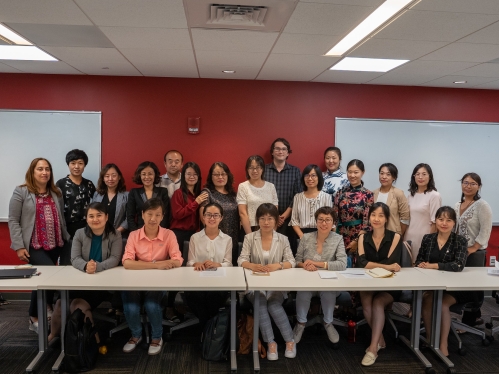
Accordion Content
-
Global Experiential Learning (GEL)
Hosted by Rutgers Makerspace at the Division of Continuing Studies (DOCS), this English-language interdisciplinary summer study opportunity challenges students from around the world to examine global challenges and topics in biomedical sensors, human-centered design, agriculture, sustainability, and civil solutions. These tracks will help students to discover solutions that will impact public health, food source sustainability, energy consumption, and transportation infrastructure. This is part of a series of short-term programs for international students sponsored by Rutgers Global–International Student and Scholar Services.
Summer Session for International Students
Earn one credit per week at Rutgers from a catalog of over 2,200 courses. Opportunity presented by the Rutgers Office of Summer and Winter Programs.
-
Summer Scholars
International high school students can register for classes and visiting students during the summer months. Students must meet the full time requirements (one credit per week during the summer). All minor students must arrange their own off-campus housing before confirming their acceptance for this program.
Young Scholars Program in Discrete Mathematics
The Rutgers Young Scholars Program in Discrete Mathematics is a summer program for mathematically talented high school students. It provides a mathematically rich environment to high school students interested in mathematics, and is designed to encourage them to consider careers in the mathematical sciences.
Top University Preparation (TUP) Program
In partnership with the Top Universities Preparatory (TUP) Academy, the Rutgers TUP Program is a one-year hybrid (credit and noncredit) program designed to prepare high-achieving international high school school seniors for admission to and successful study at top U.S. colleges and universities. The curriculum is tailored to students’ English language and mathematical skills; students will be placed in credit-bearing English courses depending upon their Rutgers placement scores. The remaining courses will include pre-calculus, public speaking, and a choice of electives.
-
-
Be registered for a minimum of one credit per week during the summer
-
Must be a part of an approved summer or hybrid language program
-
Have a valid passport valid for at least six months beyond your period of stay in the United States (unless exempt by country-specific agreements)
-
Evidence of English proficiency
-
Show sufficient proof of living expenses
-
Obtain at least a minimum level of health insurance coverage for you (and your family, if accompanying you) and show proof of adequate coverage
-
Payment of any student fees
-
Evidence of current immigration status if currently in the United States
-
Tailored and Certificate Programs
Tailored group and certificate programs can range from a week, to several months or more, and may contain classes for credit, or specially prepared seminars that are not for credit, or a combination of both. They may include language training, laboratory work, or research as a part of the overall course. Tailored and Certificate Programs are required to meet the full-time study requirement.
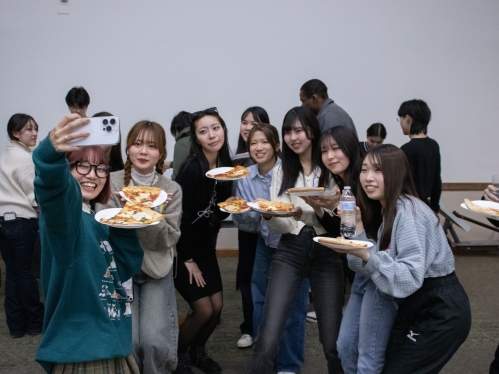
Accordion Content
-
Active tailored programs
Jilin-Rutgers Chemistry Department Exchange Program
PALS-Rutgers in collaboration with the Department of Chemistry and Chemical Biology hosts twenty students from Jilin University for seven months. Students participating in this program receive intensive English instruction while also working towards undergraduate credits in chemistry at Rutgers.
Active certificate programs
Golf Turf Management School
Trainees can opt to pursue a three-week course or a two-year certificate program. The two-year certificate program focuses on in-depth turfgrass management knowledge and skills. This internationally recognized program consists of two 10-week sessions on campus and a paid internship of your choice in between. Offered by NJAES.
-
- Meet the full-time study requirement
- Be accepted as part of a tailored or certificate program
- Have a valid passport valid for at least six months beyond your period of stay in the United States (unless exempt by country-specific agreements)
- Evidence of English proficiency
- Show sufficient proof of living expenses
- Obtain at least a minimum level of health insurance coverage for you (and your family, if accompanying you) and show proof of adequate coverage
- Payment of any Short-Term Non-Degree Student Fees
- Evidence of current immigration status if currently in the United States
Short-Term Non-Degree Program Application Process:
- Apply to a program: Apply and be accepted to the appropriate sponsoring unit/department offering.
- Rutgers processes application: Complete the forms given to you by the sponsoring unit. You will receive notification that your application is accepted by Rutgers; the university will process your information.
- Receive Certificate of Eligibility: I-20 (F-1 visas) or DS-2019 (J-1 visas) Certificate of Eligibility and supporting documents are mailed to you. These are necessary for your visa application.
- Pay the SEVIS fee: Once you’ve received your I-20 or DS-2019, you will need to pay a SEVIS fee to the US Department of Homeland Security. In order to pay, complete Form I-901 along with the payment via mail or the Internet (dependents in F-2 or J-2 status are not required to pay the fee). The SEVIS fee must be paid at least three business days prior to a visa interview or the filing of the change of status application in the US. Learn more about the SEVIS fee. Make sure you keep a printout of the receipt confirming the I-901 fee payment.
- Apply for and receive an F-1 or J-1 student visa: Use the I-20 or DS-2019 issued by Rutgers to apply for your visa. Review these tips on applying for a student visa, then apply for a student visa from the United States consulate in your country of citizenship or country of permanent residence.
All non-immigrant visa applicants must complete Forms DS-160 (online non-immigrant visa application). You can access this form at https://travel.state.gov/content/visas/en/forms.htm - Applicants will also need to appear for an in-person interview at the U.S. consulate in their home country in English and must pay a visa application fee.
- Map Your Arrival: Once you have received your F-1 or J-1 visa, you can travel to the US with your valid passport and your I-20 or DS-2019. You should enter the US no more than 30 days before the start date on your I-20 or DS-2019. To help plan your arrival, view our online module on Mapping your Arrival to the US.
- Create an RGLOBAL account complete your data information, and complete your online check-in after arrived the U.S. This is a legal requirement of your F-1 or J-1 status. This process can be started before arrival but must be completed once you arrive in the United States.
